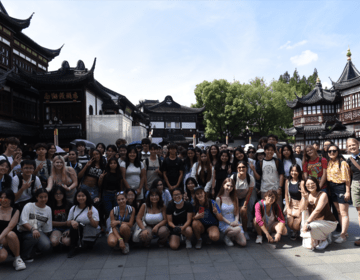Week 4: Nanjing
On the second to last day of the program, we took a post STAMP test to measure our progress. As I was taking it I literally thought this to myself: Wow, I actually know stuff!
Now, don't get me wrong. I had taken Mandarin for two years before this, but my confidence in my skill was nonexistent. Without realizing it, one month passed and I not only learned and improved my mandarin speaking, listening, reading, and writing skills, but also greatly improved my confidence. In my opinion, confidence is one of the most important factors toward learning a language because 1) often when I’m trying to decide how to say or write something on the spot I have to go with my gut and 2) if you don’t speak confidently people are less likely to take you seriously, especially in China it seems.
Within those four categories I think my speaking improved the most, because my teacher (杨老师)made us talk a ton in class, and everyday our homework would be to interview our host family on some topic (therefore talking), summarize it in our own words (Mandarin, of course) and then orally present in class.
I didn’t expect myself to improve as much as I did. I knew I would definitely get better, but I didn’t expect my speaking skills to improve so much. My writing and reading skills progressed as I expected though. Going forward I’m a bit worried that I won’t have opportunities to practice speaking, and end up forgetting everything. But I do have a pretty great Mandarin teacher at school, so I’m not too worried!
Oh! Also, like I said a few posts ago, language is not a barrier. For example, when I first met my host family, even the limited Mandarin I knew brought us together. Along with my progress throughout the program, I was able to grow even closer to them because of the skills I learned! I talked to them using new vocab and sentence structures (and thoroughly impressed them, might I add) but also made some pretty embarrassing mistakes (which they laughed at me for but kindly corrected me which brought us even closer!!).
The main difference between learning mando in the states and in China is the experience. In China, I was literally learning through every single experience there, whether at my host fam’s house or on the bus ride to school. In the states, I didn’t get the context of what I was learning. It was like, okay, more mando, more words to speak a language that isn’t spoken in commonplace in California. In China, there’s more practicality to what you’re learning (also props to the CIEE curriculum and values which emphasize on usefulness)!!
My favorite experience would be… well, there’s too many, but one I vividly remember is shopping at a huge two floor grocery store with my host sister. I bought so many yummy asian snacks for my family! But, the problem was that my host sister and I had to walk with alllllll of them all the way back to our apartment. In ninety degree humid weather. Phewf. That was a workout.
Lastly, one of the most vital pieces of the program was the Into the Community section, which I briefly talked about a few blog posts ago. Honestly, I was scared to ask a random citizen some questions with my poor Mandarin skills, but because I was doing it with the rest of my class I was less nervous and became more confident. Actually, out of my classmates I was the one pushing them to ask people questions, which also made me more confident because I would sometimes set the example and it would push me to do my best and not waste the opportunity! In the end, I not only gained confidence (a theme in this post, it seems) but also I got to observe and experience first hand how the Chinese people in Nanjing act when in the public area. It was different than in America because most people (at least where I live) would not even give me a second glance and take time out of their busy day to talk to a kid who barely knows the language. For the Nanjing locals, they stopped to talk to us, or at least most of them did. I won’t lie and say it went smoothly every time. I said “uhhhhhh” a LOT and nervously laughed a TON but most of them were pretty forgiving and my friends were there to back me up. Oh, also our program leader was supervising from a distance in case anything went wrong. Though nerve wracking, the experience was a golden one.
-Sarah H.
'Global Navigator Voices' is a collection of blog articles and pictures by our very own high school study abroad participants. Follow their adventures before, during, and after their experiences abroad!
Related Posts
Wuxi (无锡) - Day 2!
Hanfu (汉服) refers to the traditional clothes worn by the Han ethnic people of China. In ancient times, hanfu was distinguished by social status, occupation, and occasions. Those in the... keep reading

Exploring Shanghai - Visiting Yu Garden and Old City God Temple
On July 18, students visited the Yu Garden (豫园)and the Old City God Temple (城隍庙) in downtown Shanghai. During the excursion, students walked with their peers to explore the history... keep reading
